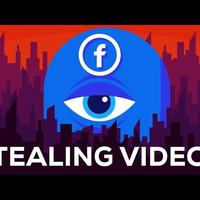How Facebook is Stealing Billions of Views
A few days ago Facebook proudly announced that
they'd achieved eight billion video views a day.
That's really impressive,
until you learn
that in the first quarter of 2015,
seven hundred and twenty-five
of the 1000 most-viewed videos on Facebook
were stolen,
amassing a total of 17 billion views.
Sites and content aggregators
steal videos from YouTube
to go viral on Facebook.
These videos go viral
because Facebook is cheating.
They rig their algorithms so that videos uploaded into their player
are preferred to YouTube links,
because users
should be kept as long as possible on the site
so Facebook can show them
as many ads as possible.
This is after all their business model.
But it also cheats when it comes to views.
A view is counted after three seconds
even if the video is muted.
Which means that because of autoplay,
if you scroll through your timeline slowly enough,
you count as a viewer.
That means engagement is terrible,
compared to Youtube views,
Facebook views plummet after a few seconds,
because most views are not real.
But large numbers are impressive,
so Facebook keeps pretending.
While this forced virality is weird,
the real problem is the so called "Freebooting",
the stealing of videos.
Since Facebook prefers its own player,
stolen videos reach way more people than the original.
Lately, this has happened to us more and more often.
The most recent example
amassed 3.2 million views
and 140,000 shares
in 2 days, while our old post
just reached 100,000 people and got shared 1000 times.
Other creators are hit even harder,
SmarterEveryDay's videos get stolen constantly,
getting viewed up to 17 million times.
But even this is dwarfed by examples like
Tyrese Gibson,
a singer who steals viral videos
like this one with 86 million
views on his Facebook page.
He adds a link to buy his music, too.
He's not alone in this, a whole group of people
have built their online presence around stealing
other people's work.
This is really bad for
independent creators.
Contrary to popular belief,
stolen content gives creators close
to no exposure at all.
Only the thief and Facebook profit
from this.
Quality content takes a lot of
creativity, time and love.
In our case, a single video
literally takes hundreds of hours to make.
Even we, with more than a million subscribers
are dependent on the ads and exposure.
Without ads, and the support of our generous patrons, we could not make videos.
For a small creator, a viral video can be the difference between a career and a hobby.
On YouTube, this kind of theft is not a problem, because they have major safeguards that protect content from being stolen.
Although, the Content ID system is far from perfect, especially for film critics and gamers.
Facebook, on the other hand, pretends everything is fine and constantly announces one milestone after the other.
But things are not fine.
Let's look at the process of claiming your copyright on Facebook in the last year.
One: get an e-mail or tweet from a fan, that gives you a direct link to your video.
It's not possible to search for your videos on Facebook yourself; you depend on luck to find your stolen videos.
Two: search for 'Facebook copyright infringement' on Google, because it's actually faster this way.
Three: fill out an annoyingly long contact form.
Four: watch the views on your stolen videos rise.
Five: Facebook finally pulls the video.
Conveniently, the video has already gained 99% of all the views it will ever get.
The thief doesn't have to fear any negative consequences at all.
This is what succesful creators have to deal with constantly,
and on top of losing out in terms of exposure and money, it just feels like a violation to be treated like that.
In a recent statement, Facebook announced they want to change.
But it's hard to take them seriously when it still takes days for a stolen viral video to be taken down,
and Facebook does not share the profits made from it.
At this point, Facebook is not a partner creators look forward to working with.
They've built their video empire on stolen content, and disregard for original content creators.
This is absolutely unacceptable for a corporation worth billions of dollars.
Facebook is already testing various monetization models that will give the uploaders a cut of the ad revenue.
Which, with the current state of play, is troubling.
Right now, this is mainly being tested with big media companies,
but, as creators, we don't feel like we're being asked or taken into consideration by the giant business Facebook.
What can you, as a viewer, to do help here?
If you spot stolen content on Facebook,
make a comment linking to the original content.
Alert the original creator,
because only they can file a copyright report.
Share this video, or the one done by SmarterEveryDay.
We all want the same thing: a free internet that's the basis for creativity, community and great stuff.
We sincerely hope that Facebook will soon become a partner instead an obstacle to this goal.
For more in-depth information, we recommend this article by Hank Green.
And if you want to support us in our endeavour to survive in the world of online video and make more videos,
you can do so on Patreon.com.

